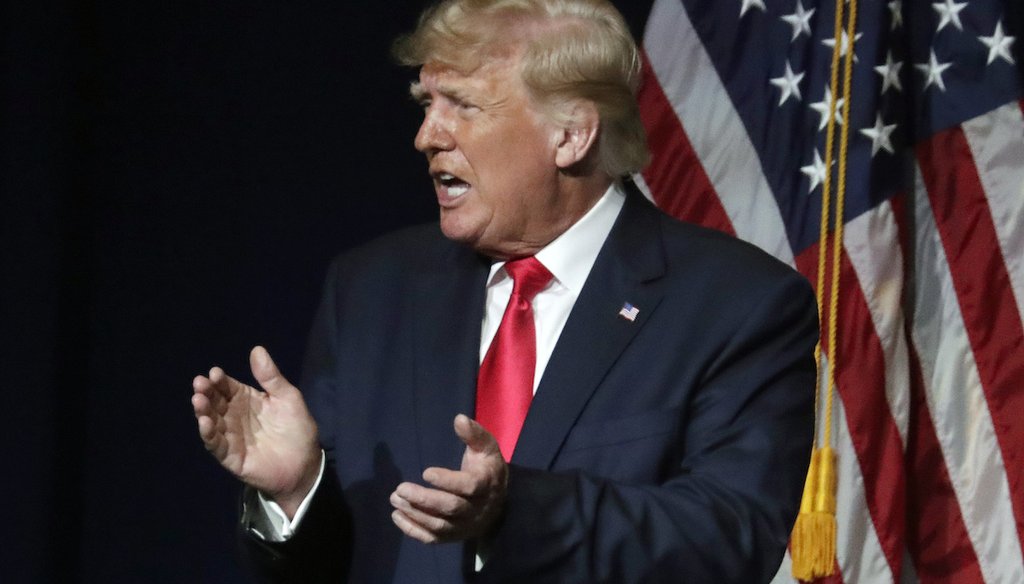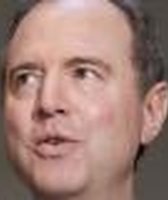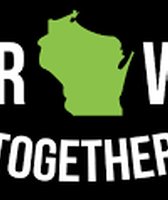Stand up for the facts!
Our only agenda is to publish the truth so you can be an informed participant in democracy.
We need your help.
I would like to contribute

Former President Donald Trump applauds the crowd after he spoke at the North Carolina Republican Convention Saturday, June 5, 2021, in Greenville, N.C. (AP)
If Your Time is short
-
Former President Donald Trump repeated a slew of falsehoods about the 2020 election in a speech before Republicans in North Carolina.
-
Trump said that there had been “Indians getting paid to vote in certain states, including Arizona and Nevada.” He did not elaborate or respond to our emails seeking evidence.
-
Some get-out-the-vote groups offered raffles to encourage Native Amerians to register to vote or vote.
Speaking before North Carolina Republicans, former President Donald Trump on June 5 rehashed a number of falsehoods about the 2020 election that we’ve heard before.
He claimed that Democrats used "mail-in ballots to steal an election." That’s wrong. Democrats did not steal the election. Trump lost, and Joe Biden won. There is no evidence of widespread fraud that would alter the results. Officials in Trump’s own administration said the election was secure.
But there was one new claim that stood out to us. While alleging widespread fraud, Trump pointed the finger at one minority group, suggesting it was to blame:
"Indians getting paid to vote in certain states, including Arizona and Nevada, getting paid to vote," Trump said. "You’re not allowed to get paid to vote."
We emailed Trump’s press office to ask for his evidence that this group of voters were paid to cast ballots and did not receive a reply by our deadline.
Sign up for PolitiFact texts
Trump’s statement that "Indians getting paid to vote" is likely a reference to get out the vote efforts in Native American communities. The organizers of the efforts said they were intended to encourage voting generally, not an attempt to influence election outcomes. Still, such efforts can be considered at odds with election law, depending on the specifics of each case.
In 2020, several national groups such as the Native Organizers Alliance worked in multiple states, including Nevada, to boost Native American voter turnout, as did several tribes and local nonprofits, said Teresa Melendez, one of the organizers of the Nevada Native Vote Project.
Teresa Melendez and her husband, Brian Melendez, told PolitiFact that their nonpartisan organization received grants to hold get-out-the-vote efforts across the state.
"The goal was to increase the number of registered voters, increase access to polls for early voting and election day, and also develop a Native voter database," Teresa told PolitiFact in a June 7 telephone interview. Nevada voter registration doesn’t require voters to provide their race or ethnicity, so there are no official records on the number of Native American voters. Estimates vary, but about 3% of the voting age population in Nevada is Native American, but there isn’t definitive data on how many are registered.
The get-out-the-vote events offered free food such as tacos, hot dogs and snow cones and included giveaways like gift cards. People did not have to provide proof of voting to receive something free.
"Anybody who walked up to a booth would get free stuff — a snow cone, a T-shirt, whether they were Native or non-Native," Teresa Melendez said. "Raffles are a cultural staple in our communities. At every tribal event you see food, raffles."
The Nevada Native Vote Project included a post on its Facebook page for an event in the Reno-Sparks Community, which hosted a virtual raffle on Election Day that included Visa gift cards ranging from $25 to the grand prize of $500. The Facebook post stated that tribal members, residents and employees could send a photo of themselves with an "I voted" sticker or screenshot of their completed ballot to enter the raffle.
The Nevada Indian Commission, a state agency, also posted announcements on Facebook about Native American tribes or colonies offering a Visa gift card raffle or other giveaways on Election Day. "After voting, grab some food and Natives Voting swag. Plus raffles+ giveaways!" stated some of the posts.
Trump allies cited giveaways to voters by the Nevada Native Vote Project in a November lawsuit that sought to have Trump declared the winner. The lawsuit cited video of the person wearing a Biden mask beside a van with the Biden/Harris logo. "The evidence will show that there were no less than 500 of these illegal and improper votes," the lawsuit alleged. Biden won Nevada by about 34,000 votes.
In a statement in response to the lawsuit, the Nevada Native Vote Project said that the event with "Biden/Harris propaganda" wasn’t sanctioned by the project.
"No member of our staff, contractors, or volunteers were involved in the event mentioned in this lawsuit, in any capacity," the project wrote.
In a 34-page ruling in December, District Court Judge James Todd Russell found "no credible or reliable evidence" that the election was affected by fraud. The plaintiffs didn’t prove that the Nevada Native Vote Project "gave or offered to give any person anything of value for the purpose of manipulating or altering the outcome of the election," or prove that the project acted on behalf of the Biden campaign, Russell wrote.
The Nevada Supreme Court affirmed Russell’s ruling.
However, Nevada Secretary of State Barbara Cegavske’s office released a report in April that stated law enforcement was investigating an allegation that members of the Nevada Native Vote Project violated federal and state laws that prohibit bribes or expenditures to influence voting. A spokesperson for Cegavske said her office doesn’t comment about ongoing investigations.
Richard Hasen, an election law professor at University of California Irvine, said he didn’t know anything specific about the giveaways at issue in Nevada. However, Hasen said giveaways to anyone who votes in a federal election are illegal, even if it is just payment to get people to turn out to vote.
"Yet these giveaways are quite common," Hasen said. In 2008, Hasen wrote that a free giveaway by Ben & Jerry’s ice cream to anyone who showed they voted could violate federal law. Ben & Jerry’s then offered free ice cream to everyone on Election Day. Hasen said giveaways are legal if they are not tied to proof of voting.
We found less information about any giveaways to Native American voters in Arizona.
Patty Ferguson-Bohnee, director of the Indian Legal Clinic and a law professor at Arizona State University, told us that the Pascua Yaqui Tribe held raffles to encourage people to complete the census form or register to vote. We found some Facebook posts congratulating winners of such raffles in October.
"You can do that under the law as long as you don’t say ‘you have to register to vote to get those items,’" Ferguson-Bohnee told PolitiFact. "People weren't getting paid to vote."
The Associated Press found that Native American turnout in Arizona helped secure Biden’s win.
Voters on the Navajo and Hopi reservations in Arizona cast nearly 60,000 ballots in the Nov. 3 election, compared with just under 42,500 in 2016, the AP found. The New York Times found that Biden received more than 80% of the votes cast by Navajo voters in Arizona and in the smaller Hopi Reservation. Biden won Arizona by about 10,500 votes.
RELATED: Trump falsely implies Arizona audit has exposed fraud
RELATED: Fact-checking Donald Trump’s tweet firing Christopher Krebs
RELATED: No truth to the claim that Arizona audit found Trump up by 250,000 votes
RELATED: No proof for Trump claim that a database for 2020 election in Ariz. was deleted
Our Sources
Rev.com, Donald Trump Speech Transcript at North Carolina GOP Convention Dinner, June 5, 2021
AP, State judge rejects bid to nullify Biden election in Nevada, Dec. 4, 2021
Nevada Native Vote Project, Facebook, Nov. 3, 2021
Nevada Native Vote Project, Statement, Nov. 19, 2021
CAP Radio, Native American Voters Struggle To Be Heard As Early Voting Begins, Oct. 16, 2020
KNPR, Nevada Native Vote Project Wants Native American Voices To Be Heard In November, Oct. 23, 2020
Nevada Independent, Tribal leaders spearhead mobilization efforts for untapped Native voters dealing with tyranny of distance, Nov. 3, 2020
Nevada Independent, Organizers believe Nevada Native turnout was historic, despite gaps in exit poll data, Nov. 20, 2020
Nevada Public Radio, Trump Campaign Takes Aim At Nevada Native Vote Project, Nov. 23, 2020
Associated Press, Native American votes helped secure Biden’s win in Arizona, Nov. 19, 2020
Democracy Docket, Law vs Whitmer (Nevada case), 2020
American Bar Association Journal, Election Law Blogger Responsible for Free Ben & Jerry’s, Nov. 5, 2008
Washington Examiner, Pro-Biden effort offered Native Americans $25-$500 Visa gift cards and jewelry to vote, Dec. 3, 2020
Philadelphia Inquirer, Pennsylvania man admits he voted for Trump with his dead mom’s name: ‘I listened to too much propaganda’ May 4, 2021
Facebook, Reno-Sparks Community event, Nov. 3, 2020
Nevada Indian Commission, Facebook posts about voter events, 2020
New York Times, Native Americans Helped Flip Arizona. Can They Mobilize in Georgia? Dec. 4, 2020
Today, Vote, then treat yourself to these Election Day freebies from Krispy Kreme and more, Oct. 27, 2020
National Congress of American Indians, Every native vote counts, Accessed June 8, 2021
Pascua Yaqui Tribe, Facebook post, Oct. 3, 2020
Legal Information Institute, 18 U.S. Code § 597 - Expenditures to influence voting
2013 Nevada Revised Statutes, Chapter 293 - Elections, NRS 293.700 - Bribery of elector.
PolitiFact, List does not show over 14,000 dead people cast ballots in Michigan’s Wayne County’, Nov. 6, 2020
Email interview, Richard Hasen, University of California Irvine law professor, June 7, 20201
Telephone interview, Patty Ferguson-Bohnee, director of the Indian Legal Clinic and a law professor at Arizona State University, June 8, 2021
Telephone interview, Teresa and Brian Melendez, Nevada Native Vote Project, June 7, 2021
Telephone interview, Ethan Doig, Nevada Native Vote Project strategy coordinator, June 7, 2021
Email interview, Katie Conner, spokesperson for Arizona Attorney General Mark Brnovich, June 8, 2021
Email interview Jennifer Liewer, Maricopa County Attorney’s Office spokesperson, June 8, 2021
Email interview, Megan Gilbertson, Maricopa County Elections Department spokesperson, June 8, 2021














































